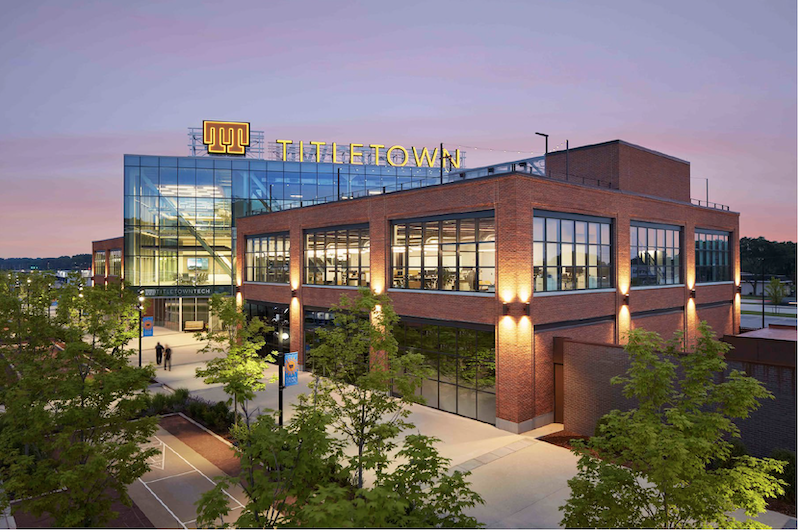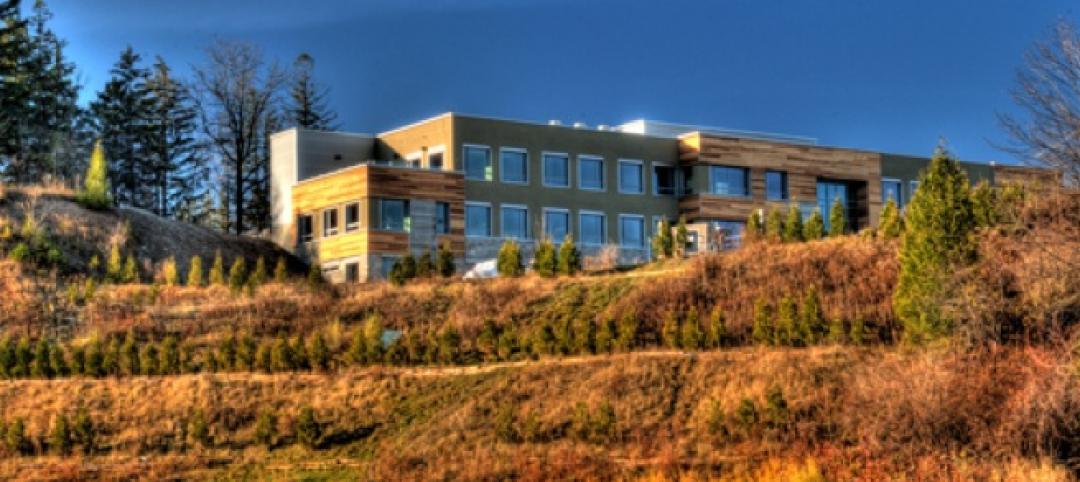Football is often described as game of strategy. So perhaps it wasn’t surprising that the Green Bay Packers, through a joint venture between the team’s development arm and Microsoft, recently opened TitletownTech, a 50,000-sf innovation center in Green Bay, Wis., that is set up to cultivate and provide financial support to high-growth startup companies.
SGA, the architect on this project, has created a three-level “stage on which innovation and collaboration can flourish,” states Brooks Slocum, the firm’s New York Studio Manager. He elaborates that the building’s design applies “spatial strategies” that “maximize” proximity, flexibility and spontaneity.
The design reflects Wisconsin’s old mill buildings, showcasing brick, steel, and wood. Those features are juxtaposed with high-tech glass and state-of-the-art materials.
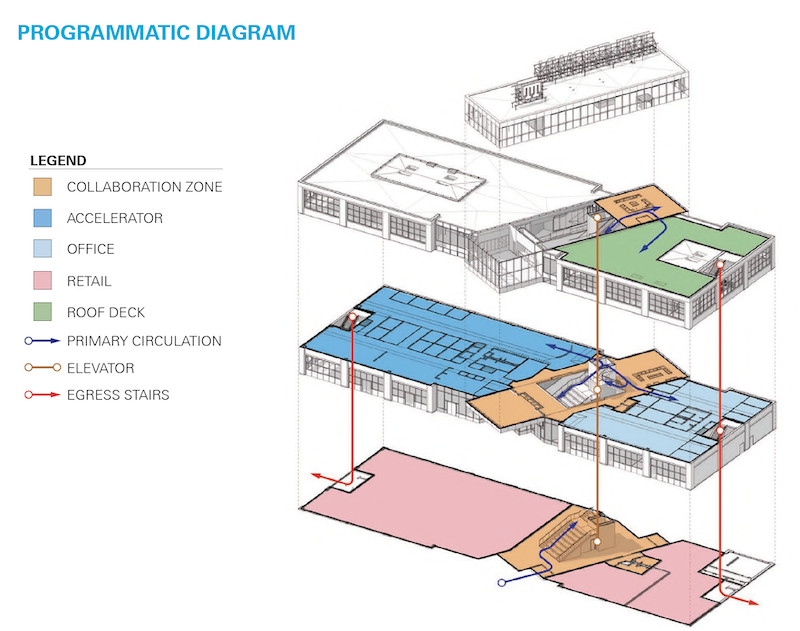
TitletownTech is designed and organized into three levels that promote user collaboration and interaction. The second floor is devoted mainly to office space.
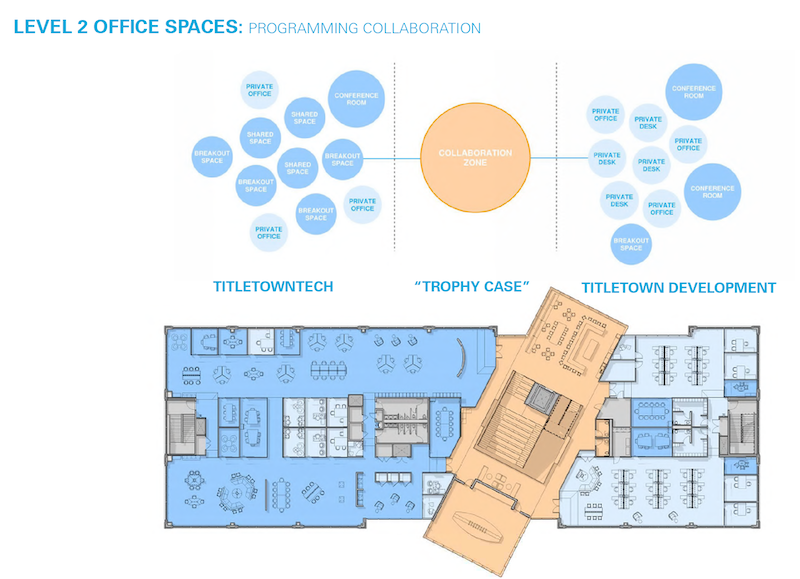
Three components drive TitletownTech, which actually has been operational since last summer but had its grand opening on October 18:
•An innovation lab, focused on creating new ventures: where entrepreneurs and established regional businesses can engage to develop ideas, explore disruptive new business models and next-generation technology solutions. The first floor includes flexible seating reminiscent of stadium bleachers. Informal lounges and social spaces are interspersed throughout the building. “Hot spots” allow guests to congregate for impromptu meetings. And “sandbox” spaces are equipped with oversized writable magnetic walls to help users flesh out ideas and discussions.
•A venture studio, focused on building ventures: where new and emerging business models and scalable industry solutions are developed into stand-alone startup ventures. Microsoft will have employees based at TitletownTech, including a Technologist in Residence, who can be resources for entrepreneurs. Microsoft’s TechSpark initiative—a civic program created to focus on communities in six states that include Wisconsin—will also have a representative on site. (Microsoft’s agenda at TitletownTech includes its goal to eliminate the rural broadband gap for millions of Americans.)
•A venture fund, focused on funding and investing in high-growth startups aligned with industries in Northeastern Wisconsin that will bring opportunity to the region. As of last October, the venture fund had $25 million, and its limited partners include AmeriLux International, Baird, Cornerstone Foundation of Northeastern Wisconsin, Dickman Ventures, Green Bay Packaging, N.E.W. Venture Foundry, Plexus, Schreiber, Schneider, Sartori Cheese, The Village Companies and Weyers Investments, Delaware North, New York Mets and Sterling Project Development.
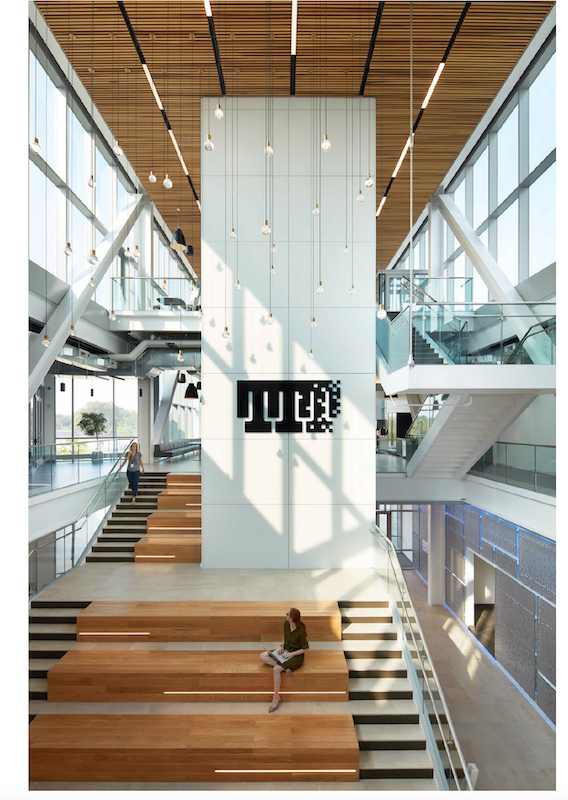
The first floor of an expansive atrium features flexible seating that suggest stadium bleachers, and encourages people to interact as that move from level to level.
TitletownTech is integrated into the Packers’ 45-acre Titletown District, located west of the team’s Lambeau Field stadium. The District’s 20-acre first phase, completed in 2017, includes a hotel, retail, restaurants, and sports medicine center. Phase 2, whose construction began last June, focuses on residential and commercial buildings, including at least 54 townhouses under constuction, as well as a five-story office building, and 152-unit apartment building. So far, the Packers have invested $170 million in its Titletown District.
“Northeastern Wisconsin has a burgeoning entrepreneurial ecosystem, and we felt Titletown would be a perfect place to further spur economic expansion in the region and beyond by bringing world-class digital innovations and expertise to Greater Green Bay,” explains Aaron Popkey, a spokesman for the Green Bay Packers. He goes on to say that TitletownTech will serve as a creative center where digital solutions are developed for key market challenges.
TitletownTech is already working with a handful of companies that include Oculogica, a digital healthcare firm that has developed the EyeBOX, the first FDA-approved neuro-diagnostic device that uses proprietary and innovative technology to track eye novement to determine if a person has a concussion (a tool that might benefit the football team directly).
Through BIM coordination, SGA and Miron Construction, TitletownTech’s CM, reduced the innovation center’s construction costs by between 1.5% and 3%. Utilizing Enscape software’s real-time rendering capabilities, SGA’s models represented the actual materials, design intent, specifications, detailing, and coordination. The models helped to identify, for example, that structural beam openings were too small, and that a large fan in the building’s atrium needed a framing system and mounting points.
Preconstruction visualization for the innovation center, offices, and boardroom also provided scheduling savings. And the team was able to spot MEP/FP clashes and re-route systems in a 3D clash-protection process.
Editor's note: Some information about Titletown Tech, and comments from Green Bay Packer spokesman Aaron Popkey, were added after the initial posting of this article.
Related Stories
| Sep 13, 2010
Triple-LEED for Engineering Firm's HQ
With more than 250 LEED projects in the works, Enermodal Engineering is Canada's most prolific green building consulting firm. In 2007, with the firm outgrowing its home office in Kitchener, Ont., the decision was made go all out with a new green building. The goal: triple Platinum for New Construction, Commercial Interiors, and Existing Buildings: O&M.
| Aug 11, 2010
CTBUH changes height criteria; Burj Dubai height increases, others decrease
The Council on Tall Buildings and Urban Habitat (CTBUH)—the international body that arbitrates on tall building height and determines the title of “The World’s Tallest Building”—has announced a change to its height criteria, as a reflection of recent developments with several super-tall buildings.
| Aug 11, 2010
BIG's 'folded façade' design takes first-prize in competition for China energy company headquarters
Copenhagen-based architect BIG, in collaboration with ARUP and Transsolar, was awarded first-prize in an international competition to design Shenzhen International Energy Mansion, the regional headquarters for the Shenzhen Energy Company.
| Aug 11, 2010
Jacobs, Arup, AECOM top BD+C's ranking of the nation's 75 largest international design firms
A ranking of the Top 75 International Design Firms based on Building Design+Construction's 2009 Giants 300 survey. For more Giants 300 rankings, visit http://www.BDCnetwork.com/Giants
| Aug 11, 2010
New air-conditioning design standard allows for increased air speed to cool building interiors
Building occupants, who may soon feel cooler from increased air movement, can thank a committee of building science specialists. The committee in charge of ANSI/ASHRAE Standard 55 - Thermal Environmental Conditions for Human Occupancy—after months of study and discussion--has voted recently to allow increased air speed as an option for cooling building interiors. In lay terms, increased air speed is the equivalent of turning up the fan.
| Aug 11, 2010
Architecture Billings Index flat in May, according to AIA
After a slight decline in April, the Architecture Billings Index was up a tenth of a point to 42.9 in May. As a leading economic indicator of construction activity, the ABI reflects the approximate nine to twelve month lag time between architecture billings and construction spending. Any score above 50 indicates an increase in billings.
| Aug 11, 2010
Free-span solar energy system installed at REM Eyewear headquarters
The first cable-suspended free-span solar energy system was completed today over the REM Eyewear headquarters parking lot in Sun Valley, Calif. The patented, cable-supported photovoltaic system created by P4P Energy is expected to generate 40,877 kilowatt-hours of renewable electricity per year, enough to power five to six single family homes and to prevent 1.5 million pounds of carbon from being released into the atmosphere.


